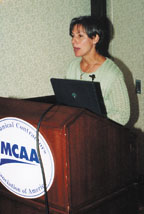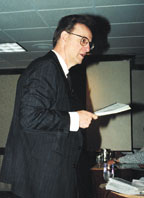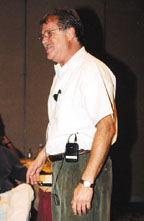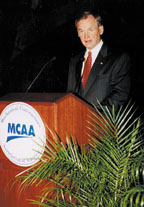

Of course you don’t. But sometimes the office can have its own share of challenges.
How about:
Ways to overcome such challenges were offered by speakers at the sixth annual Mid-Year Meeting of the Mechanical Contractors Association of America (MCAA), held here recently in Chicago.

KILLER CLAUSES
Building owners and general contractors (GCs) usually enter into a formal contract for a major building project. Then the GC turns around and tries to work out a contract with the subcontractors, including those installing the hvacr systems.It can be a long, complicated process, said Caryl Sandler Shuham, corporate counsel for John J. Kirlin Inc.
“Whoever drafts a contract has their own best interests in mind, even if they try to be neutral. So the general contractor will have his best interest in mind even as the owner has his best interest in mind when dealing with the GC.”
The result is often “killer clauses” that could have a negative impact on subcontractors. Shuham cited 20 such clauses, but noted, “there are thousands of them.”
For example, she said plan-spec jobs might have the GC including a clause that states, “The work of the subcontractor includes all work specifically set forth in the subcontract, together with any and all work necessary to properly complete the subcontract.…”
The possible killer clause deals with what is “proper” and who “determines what is proper,” Shuham said.
She said it would be better to revise that clause to say, “The work of the subcontractor includes all the work specifically set forth in the subcontract, together with any and all work reasonably inferable from the contract document as being necessary to properly complete the subcontract.”
Another potentially fatal clause might say, “Subcontractor shall be responsible for coordinating the work included in this agreement with all other trades.”
Shuham said that should be reworded to say, “Subcontractor shall assist the GC in coordinating the work included in this agreement with all other trades.”
She noted, “Subs need to say, ‘We are here to help, but we can’t accept total responsibility’ — just in case, for example, the architect speced mechanical equipment in a ceiling equivalent to putting 10 pounds of marbles in a 5-pound bag.”
Another benefit is that such revisions don’t require major overhauls. “Make changes as small and subtle as possible,” Shuham said. “Don’t make waves.”

BLACK HOLES
“Construction is not a good business; it is a great business —for the potential in improvements in accounting.” With those words, real estate broker and Bradley University Professor of Construc-tion James J. Adrian launched his session on financial management.He told the MCAA audience that this was an applicable topic because someone in a construction company sent him a check for $54,000 for a $54/year subscription to his newsletter.
That, he said, is an extreme example. But the willingness of some contractors to write off screw-ups on their books can be dangerous.
“Companies are willing to write off tools because that might be only 2% of the cost of business. But what if a typical company profit is 2%?”
He encouraged the audience to understand accountability of both employees and equipment. “Both cost money. When a worker is on a break, the machine is sitting idle.” He encouraged attendees to factor into billings “what it costs to be idle. It may be worth it to pay workers time-and-a-half to work on Saturday in order to keep equipment running.”
Subs, who usually deal with more people and equipment than general contractors, need to factor the cost of estimating into a job, since that can be time consuming.
“We can’t just be good managers of people and things. We have to be managers of paper- work.”

TIME MANAGEMENT
Monroe Porter of Proof Management Consultants, Richmond, VA, said time is a perception issue. How time is allocated in a business depends on the boss.“The problem with time management is you, not your job, not your people,” Porter said. “The only thing you have equal with everyone else in the world is time. What you do with those 24 hours is up to you.
“The paradox of time is that you can’t save it — yet we talk about saving time. There is no such thing.”
Part of the problem with finding enough time these days, he said, is that there is too much information coming in too quickly, and at too high a cost. “Computerized estimating software provides too much information to justify the cost. Technology can give you too much information.
“Cell phones create interaction that disrupts people from doing their jobs. Some small contractors have cell phone charges that are higher than their truck charges per month.”
Managing time means arranging priorities, or as Porter said, “picking the hills you are going to die on. Why bid a job you know you aren’t going to get?”
Likewise, bosses have to look at time wasters in both nonpersonal and personal terms. “Nonpersonal time wasters are environmental time wasters, which can be harder to control and usually focus on issues other than ourselves.” Some of those, he said, could be conditions at a jobsite or the weather.
“Personal time wasters are areas we have direct control of,” Porter continued These might include spending too much time with e-mail or on the Internet, or just general disorganization.
He said contractors have to put their work in perspective. “It is irrational thinking to say, ‘I must get this done or the world will come to an end.’”
Another perspective on time came from Greg Risberg, a consultant from Elmhurst, IL, whose seminar was titled, “How to Catch Your Breath When You’re Losing Your Mind.” For Risberg, relaxation is key.
Often when people are asked how they are, they say “fine.” To Risberg, that stands for Frustrated, Irritated, Neurotic, and Exhausted.
He offered a few suggestions for relaxing, including:

Employee Management
In what ranked as the highest-volume presentation at the conference, former construction industry executive and now consultant Chuck Vander Kooi of Littleton, CO, talked about employee management (as well as making a prediction, that later came true, that the Colorado Avalanche would win the Stanley Cup).“People are the greatest risk in your business,” he said. “Trucks don’t show up late for work and get married.”
He stated that employees stay for three reasons: recognition for a job well done, a feeling of self worth, and money, with recognition the most important. “Recognition comes verbally, in writing, with a raise, or with a bonus. One problem is when money comes without recognition behind it.”
Vander Kooi offered some offbeat advice regarding bonuses:
Vander Kooi proposed a three-person committee to work on awarding of bonuses. They should consider a number of areas — such as customer satisfaction, cost awareness, attitude, equipment handling, paperwork handling, safety, and quality — and assign a 1-10 scale to each employee in each area.
The speaker warned about employees he bluntly called “egg-sucking dogs.” These are loyal employees who are technically sound and self-starters. “But they become negative; something has snapped. The odds of turning someone around is slim to none in the present situation.”
That person might prove a better employee in another company, he said, so that person may need to be let go.
“That’s the Kenny Rogers School of Management. You’ve got to know when to hold them, know when to fold them.”
Publication date: 07/23/2001


Report Abusive Comment